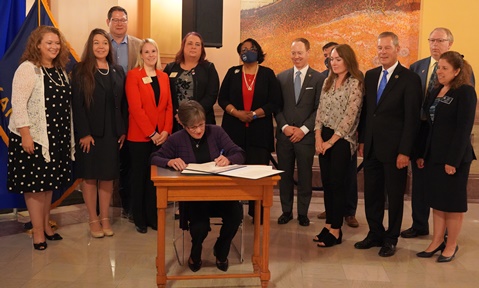
Gov. Laura Kelly today signed legislation to fully fund education for the third consecutive year.
She was joined at a signing ceremony by education advocates and a bipartisan group of lawmakers.
“When I took office, the state of Kansas had failed to fully fund our public schools for nearly a decade,” Gov. Kelly said. “That’s why today I’m proud to say that, for the third year in a row, I have signed bipartisan legislation fully funding our schools.
“I want to thank the coalition of legislative colleagues, advocates, teachers, and faculty for their advocacy. With their support, we followed through on our commitment to ensure students, teachers, and schools have the resources they need.”
During the signing ceremony, Governor Kelly said that ensuring kids have access to a quality education is good for Kansas students, and for the state’s economy.
“Ensuring kids have access to a quality education not only helps them succeed. It helps our businesses succeed and promotes economic development by providing employers with a highly-educated, skilled workforce,” Gov. Kelly said.
In addition to fully funding education in Kansas, House Bill 2134 requires an annual report card for children in foster care, authorizes limited remote learning, provides the criteria for identification of students eligible to receive at-risk programs and services, requires boards of education to allocate sufficient school district moneys to improve student academic performance, authorizes school districts to pay tuition and fees for concurrent and dual enrollment programs, expands student eligibility under the tax credit for low income students scholarship program, extends the high-density at-risk weighting, and provides ACT college entrance exams and workkey assessments to certain nonpublic school students.
Gov. Kelly also signed House Bill 2313, extending the dedicated statewide mill-levy which funds a portion of the overall K-12 budget.
HB 2313 also provides for reimbursement of property taxes for certain business shutdowns or restrictions, allows Kansas national guard and reservist members who are in good standing to receive a property tax exemption for up to two motor vehicles, authorizes appointment by the governor of a member pro tempore when a vacancy on the state board of tax appeals exists and directs post audit study of the impact of nonprofit and governmental entities competing against for-profit businesses.
